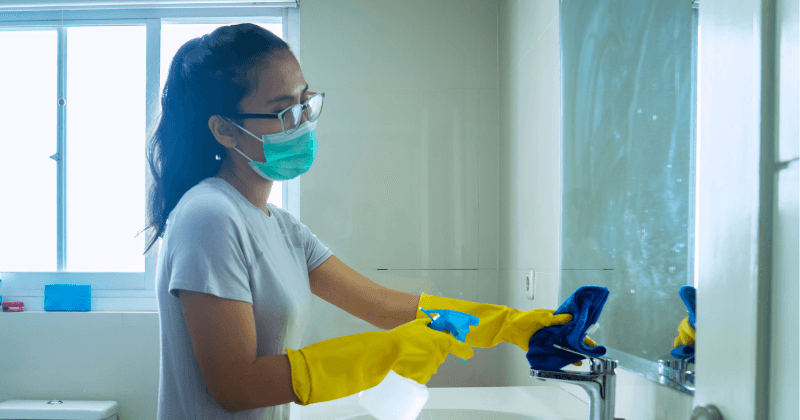Still Impacted by the Pandemic, Immigrant Workers Share Concerns About COVID-19

Hannia Benitez and her coworkers are concerned. Since the COVID-19 pandemic began in early 2020, the staff at El Vinculo Hispano, a North Carolina nonprofit serving Hispanic communities, has worked to build relationships with the local health care community to provide COVID-19 testing, vaccines, education, and treatment to those they serve. With pride, El Vinculo Hispano has been "a bridge” between the Latinx community and local non-profits, government agencies, and law enforcement, and is trusted by individuals, families, and large groups, to solve difficult situations. Yet, beyond the ongoing social, economic, and structural barriers to health these communities face, they also regularly encounter community hesitation, misinformation, and misunderstandings about the COVID-19 vaccines. Coupled with declining regulations, El Vinculo Hispano's local community is experiencing spikes in COVID-19 and long COVID.
As a Deputy Director for El Vinculo Hispano’s Lee County office, and a Hispanic Liaison, Benitez explains that local Hispanic communities face barriers which are common for many first- and second-generation immigrants around the country. Many are essential workers who have multiple jobs, limited formal education and English proficiency, and no health insurance, creating a need for extra assistance navigating the health care system. There is also a higher prevalence of many chronic diseases, placing the community at greater risk of severe cases of COVID-19, resulting in a higher chance of getting long COVID compared to other populations. But without health care access, lower rates of routine health visits result in community members being less aware of chronic illnesses they may have, making Benitez’s messages about higher risk less impactful.
For the immigrant community at large, Benitez says there are still many who are unvaccinated. Many of the unvaccinated are still getting sick, she says. This means they are still experiencing intense symptoms that were more prevalent at the beginning of the pandemic. “We are seeing higher infection rates, more hospitalizations, and more mortality cases among unvaccinated,” she says. But illness in themselves and their loved ones is sometimes not enough to encourage vaccination.
Benitez explains she is hearing important questions from the community about COVID-19 vaccines and boosters. Some questions represent a general curiosity in COVID-19 vaccines themselves, such as, “How different is the COVID vaccine from the flu, polio, and other vaccines?” Other questions display an underlying distrust of the government. “Is the government playing with the vaccines?” some ask, wondering if the government is “shooting in the dark,” and blindly encouraging additional boosters until they get their numbers right for how many doses are really needed for vaccines to be effective, Benitez explains. “Why are there so many boosters?” they wonder. Questions about vaccine side effects are also common. Benitez hears some express they understand COVID-19 vaccines are effective, preventing death or reducing the gravity of illness, but they wonder when they should stop taking vaccines that are not completely “side-effect free.”
The concerns Benitez hears highlights a difficult point to communicate about vaccines. Our knowledge of COVID-19 and its many variants is ongoing. While scientists base recommendations on decades of vaccine research, and collaborations across the world, it is impossible to accurately predict how many variants are to come, and what type of booste r will be needed to fight off future variants. Recommendations from the CDC and other organizations, like El Vinculo Hispano, are based on the most up-to-date information available, and promote the best decision an individual can make for their health for what is known in the present moment.
Despite vaccines being on the cutting edge of science, Benitez and her coworker, Elena Gonzalez, El Vinculo Hispano Workers Rights & Safety Coordinator, are worried about how relaxed regulations in the workplace are impacting essential workers, particularly the poultry workers that Gonzalez works with. Overall, Benitez and Gonzalez feel that “laxed COVID-19 guidelines” combined with “laxed protections in the workplace,” such as making masking optional while also reducing social distancing rules, pose a danger to workers. “Seeing, in our opinion, more negligent manners of dealing with COVID-19 in the workplace,” such as, they explain, COVID-19 sick days no longer being available, or being reduced, is concerning for them. “Essential workers who have gotten sick and are missing work are getting fired,” they say. Due to changes, workers who are sick with COVID-19 but are “feeling well enough” to work are still going to work, while others feel sick and don’t test and don’t tell others about how they feel. These work-environment-induced risks result in a public health threat for the larger community.
Benitez and her coworkers have concerns for their work as well. “We know COVID exists, we can see the deaths of family members and friends,” she shares, and they see the impact of long COVID on their community members, including fatigue, brain fog, and other symptoms. But questions still arise within El Vinculo Hispano, with some staff who are fully vaccinated wondering when boosters will stop being recommended. Despite the uncertainty that a pandemic brings, Benitez shares, “still, there is an ongoing satisfaction on getting COVID-19 information, resources, and services to our community. It is satisfying to see when another community member decides to get vaccinated.” With increasing concern surrounding climbing COVID-19 cases, organizations like El Vinculo Hispano, and the perspective that staff like Benitez and Gonzalez bring to the public health table, are invaluable and necessary to our continual battle for health equity.
Resources:
- El Vinculo Hispano
- MCN’s COVID-19 Pandemic page lists MCN’s top picks for internal and external COVID-19 resources.
- COVID-19 Vaccine Awareness Campaign includes fully editable campaign templates and other resources, in English, Spanish, and Haitian Creole.
- The National Resource Center for Refugees, Immigrants, and Migrants
- Log in to post comments
